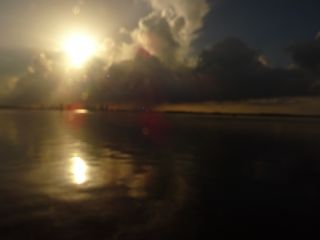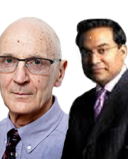Spirituality
Is Extreme Weather an 'Act of God'?
The Psychology of Belief in God's role in Natural Disasters
Posted August 21, 2015
By Dr Raj Persaud and Professor Adrian Furnham
When hurricanes impact with destruction, injury and even possible loss of life - there is obviously a massive physical dimension to extreme weather, but their mental impact will hinge on your assessment of such an event being an 'Act of God'.
Did similar natural disasters in Biblical times play a crucial role in initiating religion? If, as is anticipated, global climate change produces more unpredictable and extreme weather, then a modern resurgence in religious belief across the planet might beckon.

Researchers from Northwestern University, University of Arizona and Stanford University, have recently published an investigation into first-hand accounts from survivors of two major natural disasters--Hurricane Katrina in 2005 and the Chilean earthquake in 2010. Describing the disasters as an 'Act of God' was among the most common explanations.
The degree to which survivors encountered extreme hardship--unpredictable, disruptive, and uncontrollable experiences--predicted explanations of the events as an 'Act of God'.
The study quotes a typical response from a 46 year old woman who survived the Chilean earthquake: 'The earthquake had to be. It was God's will. We don't know which things will happen, what God will send us. God knows what happens and where He will bring us. But we must remain blind.'
The authors of the new study, Nicole Stephens, Stephanie Fryberg, Hazel Rose Markus and MarYam Hamedani, found survivors who confront the most extreme hardship--defined here as unpredictable, uncontrollable and disruptive experiences--will be most likely to explain a natural disaster as an act of God.
This study, entitled, 'Experience of Extreme Hardship Predicts Religious Meaning-Making. Who Explains Hurricane Katrina and the Chilean Earthquake as an Act of God?' was partly inspired by previous laboratory experiments showing that the desire to avoid the belief that the world is random or chaotic, increases religiosity, and leads us to look for patterns in unrelated events.
The authors of the new study argue that belief in God is partly driven by a deep human need to find meaningful explanations for what happens in life. One way to create a sense of meaning or purpose in the face of random catastrophe, is to find a causal agency that can be held responsible for such events.

Survivors of trauma often maintain a sense of control by assuming personal responsibility; blaming themselves for causing the tragedy, even though this is often counter-productive in terms of longer-term coping.
When a human agent cannot be held responsible, as in a natural disaster, people appear especially likely to turn to non-human agents, such as God.
Psychologists believe that explaining life experiences as an act of God--religious meaning-making--can perhaps be useful for transforming seemingly random or uncontrollable life events (e.g., a natural disaster) into something that has meaning and purpose.
This new study published in the 'Journal of Cross-Cultural Psychology' argues that invoking God is an effective means for maintaining a sense of control, alleviating anxiety in the face of uncertainty. It helps coping with cataclysms, such as deaths of loved ones or confronting terminal illnesses.
The research found how angry, upset or fearful you got while surviving a hurricane, did not predict the tendency to invoke God. But extreme hardships such as--watching people die and seeing dead bodies, predicted understanding the storm as an 'Act of God'.
It seems that there is something about being facing extreme hardships, such as confronting death, that predicts the tendency to explain events in terms of God. Perhaps, then, natural disasters have a unique capacity to promote religiosity, or lead people to religion? People seem to believe they are confronting an 'Act of God' regardless of how actively religious, or predisposed to religion, they were before.
Perhaps natural cataclysms powerfully prompt questions about whether life has meaning, and why some people suffer more than others. Invoking God is particularly effective for explaining the types of stressful, uncertain, unpredictable, and uncontrollable experiences confronted during and after natural disasters.
Religion seems to offer the most personally meaningful answers to questions over whether life has order, meaning, and purpose, especially in the face of extreme hardship.
Tamasin Ramsay and Lenore Manderson in their chapter entitled 'Resilience, Spirituality and Post-traumatic Growth: Reshaping the Effects of Climate Change' in the book 'Climate Change and Human Well-Being', point to the example of Brahma Kumaris, a new religious movement linked with humanitarian assistance across the world. They assisted on the ground when the Super Cyclone of 1999 hit Orissa, one of the poorest states of India.
This spiritual community began in Northwest India in the mid-1930s, believing in forthcoming cataclysmic events preceding a kind of paradise on earth. Climate change, environmental instability and extreme weather, amongst other events, indicate 'the age of confluence,' a critical point of a 5000-year cycle of life when the world is moving towards the worst and the best times of human existence.
In October 1999 one of the most devastating Indian environmental disasters ever, occurred when two cyclones occurred in rapid succession, affecting almost 16 million people.
Tamasin Ramsay and Lenore Manderson cite quotes from survivors: 'Ten members of our family, we all went to the roof and just a few days earlier my father had cut the branch of a (sacred and indigenous) banyan tree that was very near to our hut. It was raining so heavily that we could not see anything outside. We were not even able to see face to face. Water was also spinning. It was rushing at such a high speed that it was spinning. The wind and the water took away some of the house, and that banyan branch acted as a boat for us. We could see animals and people dying in front of us. Lifeless. All our crops were washed away. Other family members started crying, "What are we going to eat?" My father said, "Just hold onto that branch of the banyan tree." Our entire house was washed away and we were just holding onto that branch.' (Aahlaad) (all names are pseudonyms).
Another quote from a survivor: 'When we found our grandmother, she was all white. She was white on white and had become bloated. She still had her arms wrapped around her legs. She was floating along with so many other things in the water. (Jaishree)'
Tamasin Ramsay and Lenore Manderson point out that religion isn't always necessary to provide meaning following a disaster, and that the Brahma Kumaris don't believe natural disasters are 'Acts of God'.

For example, facing death can enhance appreciation for life to a degree not previously experienced; the loss of a home may highlight distinctions between material and social values.
Tamasin Ramsay and Lenore Manderson quote Victor Frankl, a psychiatrist not formally religious, who survived Nazi Concentration Camps, and who argues in a famous book, 'Man's Search for Meaning', that meaning is a form of healing. Searching for meaning offers a pathway out of trauma.
Victor Frankl argues suffering and failure can be tolerated if there is meaning in either. But without meaning of any kind, we end with despair.
Follow Dr Raj Persaud on Twitter: www.twitter.com/@DrRajPersaud
Raj Persaud and Peter Bruggen are joint podcast editors for the Royal College of Psychiatrists and also now have a free app on iTunes and Google Play store entitled ‘Raj Persaud in conversation’, which includes a lot of free information on the latest research findings in mental health, plus interviews with top experts from around the world.
Download it free from these links:
https://play.google.com/store/apps/details?id=com.rajpersaud.android.ra…
https://itunes.apple.com/us/app/dr-raj-persaud-in-conversation/id927466…




